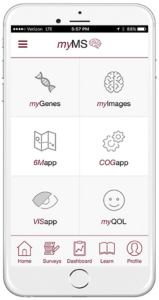Enrollment is now underway for a pilot study of the world’s first smartphone app capable of collecting large amounts of clinical, imaging and genetic data for people with multiple sclerosis (MS).

(Image/Keck School of Medicine of USC)
myMS is user-friendly app, developed by Daniel Pelletier, MD, professor of neurology at the Keck School of Medicine of USC and division chief of the Neuroimmunology and USC Multiple Sclerosis Center. The app is designed to collect data on walking, cognition, vision, quality of life, demographics, MRI imaging and genetics, and because it can be used on any smartphone, anywhere, Pelletier hopes it can help break down some of the geographic barriers encountered in traditional research.
“We have so much to discover about MS, and our traditional methods of studying it are not going fast enough,” Pelletier said. “Each incremental finding is like one drop of water in the ocean. If we want to reach the point of individualized therapy for MS, we need a massive amount of data, which is what inspired me to think of a solution that was completely out of the box.” More than 2.3 million people have MS worldwide, according to the National Multiple Sclerosis Society.
myMS app users will be able to monitor how they are doing through validated walking, cognitive and visual tasks, as well as quality-of-life questionnaires. An interactive dashboard lets users view and graph their results over time and compare them to other people, upload and view their brain MRIs within the app as well as access genetic information obtained through personal genetics company 23andMe.
“Not only will people be able to see how they’re doing in real time, but they will also be able to open new lines of communication with their doctors,” Pelletier said. “They’ll be able to open the app and show their doctor how they’re doing in their everyday life and not just in the clinic.”
The pilot study’s goals are to discover how willing people are to participate, how often they perform app-related tasks and how likely they are to share their MRI and genetic information. Participants must have a diagnosis of MS, be 18 years of age or older, have a brain MRI, live in the United States and have a smartphone. No clinical visits will be involved.
For information about how to participate in the study, visit https://tinyurl.com/myMSclinicaltrial.
— Erica Rheinschild

